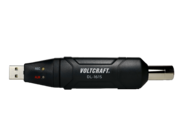Difference between revisions of "Voltcraft DL-161S"
Jump to navigation
Jump to search
Uwe Hermann (talk | contribs) (Set status to Planned.) |
|||
| Line 2: | Line 2: | ||
| image = [[File:Voltcraft DL-161S.png|180px]] | | image = [[File:Voltcraft DL-161S.png|180px]] | ||
| name = Voltcraft DL-161S | | name = Voltcraft DL-161S | ||
| status = | | status = planned | ||
| source_code_dir = | | source_code_dir = | ||
| connectivity = USB | | connectivity = USB | ||
| Line 203: | Line 203: | ||
[[Category:Device]] | [[Category:Device]] | ||
[[Category:Sound level meter]] | [[Category:Sound level meter]] | ||
[[Category: | [[Category:Planned]] | ||
Latest revision as of 18:49, 20 December 2016
 | |
| Status | planned |
|---|---|
| Connectivity | USB |
| Frequency range | 31.5Hz - 8kHz |
| Measurement range (A) | 30dB - 130dB |
| Accuracy (94dB@1kHz) | 1.4dB |
| Frequency weighting | A, C |
| Time weighting | F, S |
| Standards | IEC 61672-1 Class 2 |
| Website | Voltcraft |
The Voltcraft DL-161S is a sound level meter with USB connectivity.
See Voltcraft DL-161S/Info for more details (such as lsusb -vvv output) about the device.
This is a rebadged CEM DT-173.
Hardware
TODO
Photos
Protocol
The host sends commands and receives responses via a virtual serial port, with USB bulk endpoint 2 as a backend. A command consists of a single byte followed by any arguments to the command.
| Command | Response | Description | |||||||||||||||||||||||||||||||||||||||||||||||||||
|---|---|---|---|---|---|---|---|---|---|---|---|---|---|---|---|---|---|---|---|---|---|---|---|---|---|---|---|---|---|---|---|---|---|---|---|---|---|---|---|---|---|---|---|---|---|---|---|---|---|---|---|---|---|
| 0x0c | 0xff | Calibrate device, 2 bytes payload: | |||||||||||||||||||||||||||||||||||||||||||||||||||
| 1 | Calibration value, as a signed integer between -10 and 10, where 1 represents 0.1 dB | ||||||||||||||||||||||||||||||||||||||||||||||||||||
| 2 | Unused (0x00) | ||||||||||||||||||||||||||||||||||||||||||||||||||||
| 0x0e | 0xff | Configure device | |||||||||||||||||||||||||||||||||||||||||||||||||||
| |||||||||||||||||||||||||||||||||||||||||||||||||||||
| 0x0d | 0xff | Get stored measurement count, 2 bytes payload: | |||||||||||||||||||||||||||||||||||||||||||||||||||
| 1-2 | Always 0x0000? | ||||||||||||||||||||||||||||||||||||||||||||||||||||
| Response has 3 byte payload, representing the number of bytes used in sample memory as a little-endian integer. Each sample uses two bytes. | |||||||||||||||||||||||||||||||||||||||||||||||||||||
| 0x0f | Get stored measurements, 2 bytes payload is offset into buffer (as pages? page size?) | ||||||||||||||||||||||||||||||||||||||||||||||||||||
|